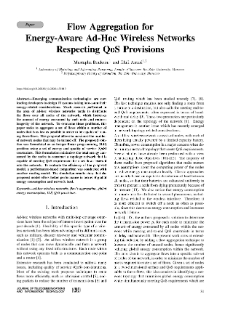Instytut Łączności – Państwowy Instytut Badawczy contains 2 324 digital objects
Object
Title: Flow Aggregation for Energy-Aware Ad-Hoc Wireless Networks Respecting QoS Provisions, Journal of Telecommunications and Information Technology, 2020, nr 1
Description:
Publisher:
National Institute of Telecommunications
Format:
Resource Identifier:
ISSN 1509-4553, on-line: ISSN 1899-8852 ; oai:bc.itl.waw.pl:2124
Source:
Journal of Telecommunications and Information Technology
Language:
Rights Management:
Biblioteka Naukowa Instytutu Łączności
Object collections:
- Digital Library > Institute's Publications > Current Publications > Journal of Telecommunications and Information Technology (JTIT)
Last modified:
Apr 25, 2025
In our library since:
Apr 28, 2020
Number of object content hits:
68
All available object's versions:
https://bc.itl.waw.pl/publication/2416
Show description in RDF format:
Show description in OAI-PMH format:
Objects Similar
Pióro, Michał Laborczi, Peter Cinkler, Tibor
Walkowiak, Krzysztof Bulira, Damian Careglio, Davide
Singh, Shivan D.G., Narayan Mujawar, Sadaf Hanchinamani, G.S. Hiremath, P.S.

